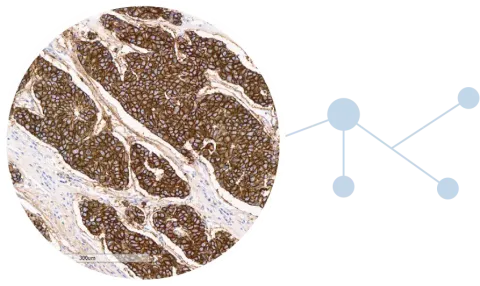Trust the experts with over 20 years of experience.
Over 118,000 women are newly diagnosed with gynecologic cancer annually in the U.S.¹
NeoGenomics gynecologic cancer solution supports the care continuum with tests that detect genomic alterations relevant to diagnosis, therapy selection, prognosis, and clinical trial options With deep genomic expertise and a commitment to precision, NeoGenomics empowers clinicians to deliver more informed, targeted care for patients facing gynecologic cancers.
Featured gynecologic cancer solutions
Comprehensive HRD Testing for Informed Ovarian Cancer Treatment
Approximately one in two patients with advanced ovarian cancer are HRD-positive,2 making HRD testing a critical step in guiding personalized treatment. Despite global guidelines recommending BRCA and HRD testing, many eligible patients remain untested—limiting access to biomarker-driven therapies.3
PanTracer Tissue + HRD offers comprehensive genomic profiling (CGP) with integrated HRD assessment. Our advanced HRD assessment covers BRCA1/2 mutation status and tumor genomic instability status (GIS), including LOH, TAI, and LST, to guide personalized treatment decisions.
With real-time molecular insights, PanTracer Tissue + HRD supports more informed, precise, and effective treatment strategies across the ovarian cancer care continuum.
Additional tests for gynecologic cancer
FOLR1
Folate receptor alpha (FRα), also known as FOLR1, is an actionable biomarker expressed in approximately 90% of ovarian cancers 7and minimally in normal tissues—making it an ideal target for FOLR1-directed therapies. The FDA-approved FOLR1 IHC assay is designed to assess FRα expression in ovarian cancer tissue and guide treatment selection.

References
American Cancer Society. Cancer Facts & Figures 2025. Atlanta: American Cancer Society; 2025.
Nogueira Rodrigues A, Souto AKdBA, de Andrade DAP, et al. Homologous recombination deficiency test validation in patients with high-gradeadvanced ovarian cancer. Front Mol Biosci. 2025;12:1524594. doi:10.3389/fmolb.2025.1524594
Bender S. Physician Gaps in Genetic Testing Knowledge May Impact Ovarian Cancer Care. Am J Manag Care. Published March 26, 2024. Available at:https://www.ajmc.com/view/physician-gaps-in-genetic-testing-knowledge-may-impact-ovarian-cancer-care. Accessed March 28, 2025.
Moore DC, Guinigundo AS. The role of biomarkers in guiding clinical decision-making in oncology. J Adv Pract Oncol. 2023;14(3):241-248.doi:10.6004/jadpro.2023.14.3.17
Helwick C. NCCN Clinical Practice Guidelines in Oncology: 2023 Updates. The ASCO Post. Published May 25, 2023. Accessed May 7, 2025.
Roche Diagnostics. Roche receives CE Mark for VENTANA FOLR1 (FOLR1-2.1) RxDx Assay as the first IHC-based companion diagnostic to identifyovarian cancer patients eligible for ELAHERE. Published November 18, 2024. Accessed April 11, 2025.https://diagnostics.roche.com/global/en/news-listing/2024/roche-receives-ce-mark-for-ventana-folr1--folr1-2-1--rxdx-assay-.html